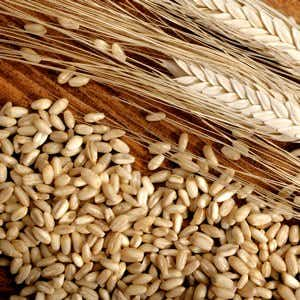
Whole grains have a golden reputation as the mainstay of a healthy diet. The old food pyramid was built on a foundation of whole grains. But how good is the evidence that eating brown rice, steel cut oats or whole wheat bread can actually promote heart health?
Examining the Evidence on Whole Grains:
To answer that question, independent reviewers for the Cochrane Collaboration analyzed nine studies comparing whole grain and refined grain consumption. These were randomized controlled trials with a total of 1,414 participants.
Unfortunately, none of the studies demonstrated clear benefits on blood pressure, cholesterol or cardiovascular complications.
The authors concluded:
“There is insufficient evidence from RCTs of an effect of whole grain diets on cardiovascular outcomes or on major CVD risk factors such as blood lipids and blood pressure.”
That is not to say that eating whole grains is pointless; it’s just that the studies don’t show whether it provides any benefit.
Kelly et al, Cochrane Database of Systematic Reviews, online Aug. 24, 2017
Nutrition Science:
This is a good illustration of how difficult it is to find definitive answers in nutrition science. Many people proceed on the assumption that they know exactly what constitutes a good diet. Very often, however, while their beliefs may not be unreasonable, they may not be supported by solid evidence.
Saturated Fat and Nutritional Evidence:
Take, for example, the case of saturated fat. A recent epidemiological study (PURE) collected dietary information from more than 135,000 people. After seven years of follow-up, the scientists found that people whose diets were high in fat were less likely to have died than those whose diets were richer in carbohydrates (Dehghan et al, The Lancet, online Aug. 29, 2017). Most surprisingly, those who at the most saturated fat were at the lowest risk of stroke.
Why is this surprising? Because saturated fat is generally accepted as a bad actor that will raise cholesterol, clog arteries and lead to premature death. In fact, we heard from a nutrition expert, Tim O’Neal, in response to our article about this scientific report.
He wrote:
“I am a registered dietitian nutritionist (RDN). I graduated from UC Berkeley with a BS in nutrition about four years ago. I recently read your article and I must say that I completely disagree with your conclusion.
“Further, I find them not only erroneous, but harmful to the public health. As a member of the Academy of Nutrition and Dietetics (AND), I can tell you that the American Heart Association (AHA) does not support your claims either.
Saturated Fat:
“Increasing saturated fat in one’s diet is not a current dietary recommendation, nor is saturated fat considered innocuous or heart-healthy in any instance. Saturated fat is still the lipid most closely associated with heart disease, since it is this type of fat that is metabolically converted into low density lipoproteins (LDL), or ‘bad cholesterol’ which becomes arterial plaque in the body, raising the risk of heart attack and stroke.
“Yes, low-fat diets have passed out of vogue, but that is because current research suggests that diets higher in mono-and poly-unsaturated fatty acids (MUFA/ PUFA)–lipids that are liquid at room temperature–are better for cardiovascular health. These lipids become converted into high density lipoproteins (HDL), or ‘good cholesterol’ that removes arterial plaque from the body. In fact, the AHA recommends increasing one’s MUFA/ PUFA intake with foods like olive oil and walnuts and limiting one’s saturated fat content to less than 10g per day.
Carbohydrates and Whole Grains:
“Further, your push to cut out all dietary carbohydrates is also flawed. The human brain runs on glucose. We need carbohydrates in our diet to function. True, it is important to reduce refined carbs and sugars. The trick is to select the correct carbs–ie whole grains, fresh fruit, and low-fat milk. The high saturated fat content in vitamin D whole milk remains deleterious to human health. Doctors and nutritionists, young and old, are still correct in advising people to avoid foods that contain dangerously high concentrations of saturated fatty acids like: coconut, butter, cream, bacon, cheese, and whole milk.
“I would appreciate it if you would print an updated article to disabuse any of your readers who’ve formed the fallacious conclusion that it is okay for them to eat as much saturated fat as they like so long as they avoid refined carbs.”
Tim O’Neal, RDN
Mr. O’Neal has represented very well the consensus of the nutrition establishment. The only difficulty is that, as we have seen, not all of the axioms stated above are actually supported by scientific evidence. It would certainly be terrific to have experimental evidence that replacing saturated fat with the liquid lipids Mr. O’Neal recommends could improve our health and longevity. Unfortunately, the latest review found “no strong evidence” that this is the case (Hannon et al, Annals of Nutrition & Metabolism, online July 29, 2017). As with whole grains, it might be a great idea, but we can’t prove it yet.
The People’s Pharmacy Perspective:
Nutrition scientists are working hard to develop the evidence that will guide us all in following healthful diets. We applaud them, and we often write about their findings. We’ll continue to do so. But keep in mind that human beings are complex, and so is human nutrition. We all need to exercise patience. In the meantime, we might do well to follow Michael Pollan’s advice:
“Eat food, not too much, mostly plants.”
It is simple enough to remember and broad enough to allow all of us some flexibility.

